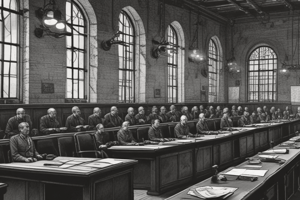Podcast
Questions and Answers
What was the primary purpose of the Nuremberg trials?
What was the primary purpose of the Nuremberg trials?
- To put on trial the major Nazi war criminals and decide their fates (correct)
- To determine the cause of World War II
- To punish all Nazi officials who were still alive
- To rebuild the city of Nuremberg
What was the significance of the London Charter signed in August 1945?
What was the significance of the London Charter signed in August 1945?
- It declared the Allied powers as the winners of the war
- It marked the end of World War II
- It established a common framework of justice for the Nuremberg trials (correct)
- It outlawed the Nazi party
Why was the city of Nuremberg chosen as the site for the trials?
Why was the city of Nuremberg chosen as the site for the trials?
- It was the capital of Germany
- It was the most damaged city in Germany
- It was the site of several infamous Nazi rallies (correct)
- It was the largest city in Germany
How many Nazi leaders were put on trial at Nuremberg?
How many Nazi leaders were put on trial at Nuremberg?
What was the duration of the Nuremberg trials?
What was the duration of the Nuremberg trials?
What was the name of the trial that took place between 1945 and 1946?
What was the name of the trial that took place between 1945 and 1946?
What was the purpose of the 216 court sessions during the Nuremberg trials?
What was the purpose of the 216 court sessions during the Nuremberg trials?
Which of the following was NOT one of the three major charges defined by the London Charter?
Which of the following was NOT one of the three major charges defined by the London Charter?
How many additional Nazis were indicted but not standing trial due to suicide and mental unfitness?
How many additional Nazis were indicted but not standing trial due to suicide and mental unfitness?
Which of the following countries was NOT one of the four principal nations of the Allied powers that administered the Nuremberg trials?
Which of the following countries was NOT one of the four principal nations of the Allied powers that administered the Nuremberg trials?
Flashcards are hidden until you start studying
Study Notes
- In 1945, World War II ended, and Adolf Hitler, Heinrich Himmler, and Joseph Goebbels were dead, but many high-ranking Nazis remained alive and in prison.
- The Allied powers decided to hold trials for these Nazi officials, known as the Nuremberg trials, in the German city of Nuremberg, which was relatively undamaged by the war and had been the site of several infamous Nazi rallies.
- The Nuremberg trials were a series of international prosecutions that decided the fates of Nazi war criminals, administered by the four principal nations of the Allied powers: the United States, Great Britain, the Soviet Union, and France.
- The London Charter of the International Military Tribunal, signed in August 1945, established a common framework of justice, allowing defendants to have their own defense attorneys and defining three major charges: crimes against peace, war crimes, and crimes against humanity.
- Twenty-two Nazi leaders were put on trial at Nuremberg, including Hermann Goering, Rudolf Hess, Joachim von Ribbentrop, and Albert Speer, with two additional Nazis indicted but not standing trial due to suicide and mental unfitness.
- The trials lasted from 1945 to 1949, with the highest-profile cases taking place between 1945 and 1946, known as the trial of the major war criminals.
- The tribunal heard testimony and reviewed evidence for 216 court sessions, displaying the horrors and crimes of the Nazis for the world to see.
- In October 1946, the Court handed down verdicts, including 12 death sentences, 3 life imprisonment sentences, 4 lengthy jail terms, and 3 acquittals.
- The Nuremberg trials established important legal precedents for future international trials, including those for Japanese war criminals, Rwanda, and the former Yugoslavia, and officially recorded the crimes of the Third Reich for posterity.
Studying That Suits You
Use AI to generate personalized quizzes and flashcards to suit your learning preferences.




